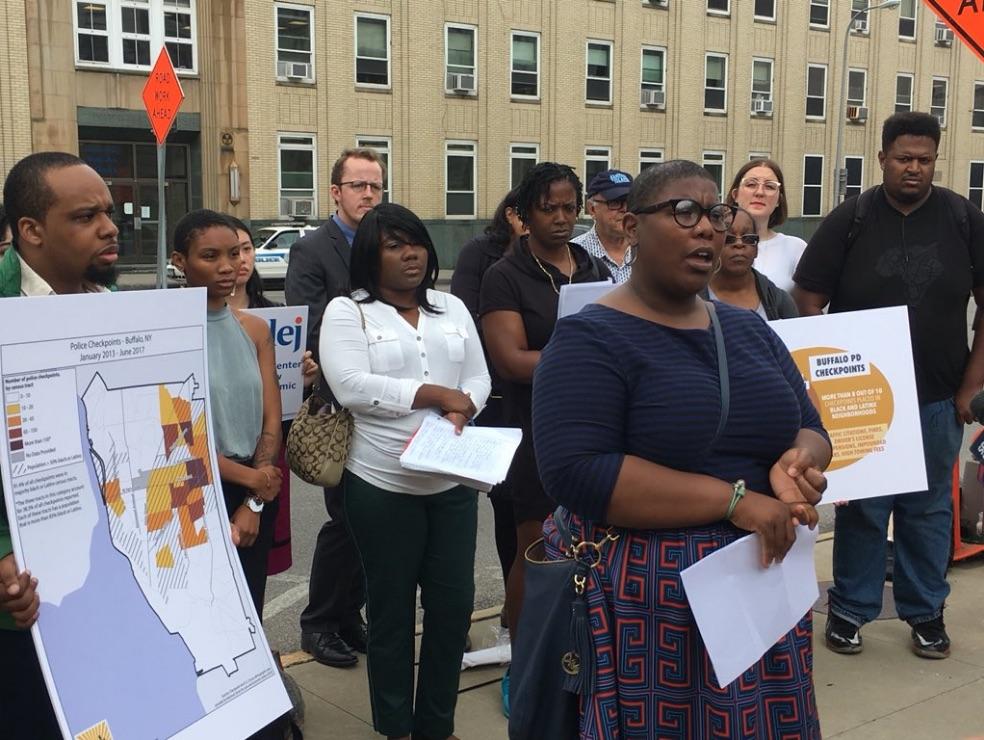Buffalo Lawsuit Challenges ‘Racial Profiling’ in Traffic Stops
Advocacy group demands an end to traffic checkpoints concentrated in Black and Latinx areas.

Residents of Buffalo, New York, are fighting against traffic enforcement they consider unfair and racially discriminatory. On June 28, civil rights groups filed a federal class action lawsuit on behalf of Black Love Resists in the Rust, an advocacy group, along with its members and other city residents, seeking an end to the practices and compensation for those harmed.
The suit stems from the Buffalo Police Department’s 2012 launch of a “Strike Force” unit, which set up traffic checkpoints in so-called high-crime areas, stopping cars to look for visible violations and sometimes searching drivers for evidence of drugs or weapons. Research based on police department data found that more 91.4 percent of these checkpoints were deployed in Black and Latinx neighborhoods.
“What they [the Buffalo Police Department] call proactive policing is actually just racial profiling,” Shaketa Redden, a lawsuit plaintiff and co-director of Black Love Resists In The Rust, told The Appeal.
According to the suit, the police seemed intent on issuing “multiple tickets for as many violations as possible,” which drove revenue into the city’s budget. For example, the suit explains, one person was issued four separate tickets for having four tinted windows, costing him $720 ($180 per window). According to research cited in the suit, the police department issued 36,818 tickets in fiscal year 2013-14, a 92 percent increase over the previous fiscal year. The police department did not respond to a request for comment from The Appeal.
Residents have said the checkpoints make them feel as if they are under siege. Drivers have sometimes been asked to provide their licenses and registration, and to explain where they were headed. “Not only were they interjected into our community, they were roving,” Taniqua Simmons, one of the plaintiffs, said at a press conference when the lawsuit was announced. “So I could leave my house, go get a gallon of milk, stop, put some mail in the mailbox and come back, and I have to go through two or three checkpoints simply because that’s what I’m told by my government is needed to keep me safe.”
Another plaintiff, De’Jon Hall, said in the lawsuit that he changed his driving routes regularly to try to avoid the checkpoints, the locations of which were sometimes shared on social media. At times, individuals being stopped at a checkpoint could be detained for 45 minutes or more.
These aren’t the first community complaints lodged against the Strike Force unit. In August 2017, Black Lives Matter-Buffalo urged the state attorney general to investigate the way the Strike Force and the Housing Unit were policing Buffalo Municipal Housing Authority developments. Residents accused them of conducting unconstitutional searches of homes and using excessive force when making arrests. At that time, a city spokesperson, Michael J. DeGeorge, told the Buffalo News that “any allegation of discrimination is completely false.”
Although the police department, faced with a public outcry, announced in February that it would disband the Strike Force unit, it has not said it would end the checkpoints. In a statement at the time, the mayor’s office said, “Mayor Brown remains focused on traffic safety in the city especially in neighborhoods and side streets where residents have expressed concerns about issues from motorists running stop signs to speeding.”
But Redden says the checkpoints also fit with Buffalo Mayor Byron Brown’s “tough on crime” approach, which she considers misguided. “If we lived in a community in a city where we were actually creating jobs for all folks, if we are thinking of what it actually means to sustain communities, then our communities would actually be safe,” she said.
Britney Wilson, a fellow with the Center for Constitutional Rights, one of the groups representing the plaintiffs in the lawsuit, noted that Buffalo is far from the only jurisdiction where communities of color are under heightened police surveillance. It “reminded us of a trend that was brought to national attention in Ferguson,” she said, “the overpolicing of Black and Latino communities for the purpose of collecting fines and fees that fuel the local economy at their expense.”
